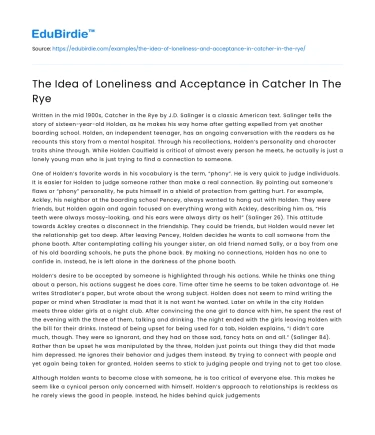Written in the mid 1900s, Catcher in the Rye by J.D. Salinger is a classic American text. Salinger tells the story of sixteen-year-old Holden, as he makes his way home after getting expelled from yet another boarding school. Holden, an independent teenager, has an ongoing conversation with the readers as he recounts this story from a mental hospital. Through his recollections, Holden’s personality and character traits shine through. While Holden Caulfield is critical of almost every person he meets, he actually is just a lonely young man who is just trying to find a connection to someone.
One of Holden’s favorite words in his vocabulary is the term, “phony”. He is very quick to judge individuals. It is easier for Holden to judge someone rather than make a real connection. By pointing out someone’s flaws or “phony” personality, he puts himself in a shield of protection from getting hurt. For example, Ackley, his neighbor at the boarding school Pencey, always wanted to hang out with Holden. They were friends, but Holden again and again focused on everything wrong with Ackley, describing him as, “His teeth were always mossy-looking, and his ears were always dirty as hell” (Salinger 26). This attitude towards Ackley creates a disconnect in the friendship. They could be friends, but Holden would never let the relationship get too deep. After leaving Pencey, Holden decides he wants to call someone from the phone booth. After contemplating calling his younger sister, an old friend named Sally, or a boy from one of his old boarding schools, he puts the phone back. By making no connections, Holden has no one to confide in. Instead, he is left alone in the darkness of the phone booth.
Save your time!
We can take care of your essay
- Proper editing and formatting
- Free revision, title page, and bibliography
- Flexible prices and money-back guarantee
Holden’s desire to be accepted by someone is highlighted through his actions. While he thinks one thing about a person, his actions suggest he does care. Time after time he seems to be taken advantage of. He writes Stradlater’s paper, but wrote about the wrong subject. Holden does not seem to mind writing the paper or mind when Stradlater is mad that it is not want he wanted. Later on while in the city Holden meets three older girls at a night club. After convincing the one girl to dance with him, he spent the rest of the evening with the three of them, talking and drinking. The night ended with the girls leaving Holden with the bill for their drinks. Instead of being upset for being used for a tab, Holden explains, “I didn’t care much, though. They were so ignorant, and they had on those sad, fancy hats on and all.” (Salinger 84). Rather than be upset he was manipulated by the three, Holden just points out things they did that made him depressed. He ignores their behavior and judges them instead. By trying to connect with people and yet again being taken for granted, Holden seems to stick to judging people and trying not to get too close.
Although Holden wants to become close with someone, he is too critical of everyone else. This makes he seem like a cynical person only concerned with himself. Holden’s approach to relationships is reckless as he rarely views the good in people. Instead, he hides behind quick judgements and a negative mindset. His thoughts should rather reflect his actions, one of someone who cares and wants to have relationships with people. Holden puts up an “I don’t like this person because” person to avoid ever getting hurt. He is not a bad character, just has a bad way of showing who he is.
Throughout Catcher in the Rye Holden tries to relate and be accepted by the people around him. He is willing to do things for people even when they take advantage of him. Because of this, he is always in a conflicted mindset. He wants to have better relationships, like he did with his deceased brother Allie, but he does not want to end up hurt again. Holden uses judgmental comments to remind himself to stay clear of any inter personal relationships.






 Stuck on your essay?
Stuck on your essay?

